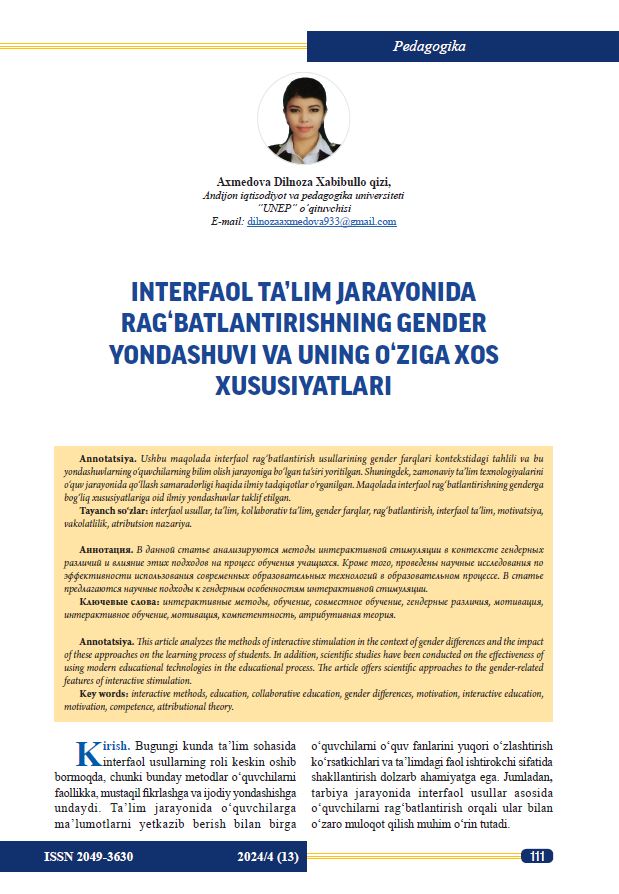Gender approach to motivation in the interactive learning process and its specific features
DOI:
https://doi.org/10.65185/mojgo.vi.84Abstract
This article analyzes the methods of interactive stimulation in the context of gender differences and the impact of these approaches on the learning process of students. In addition, scientific studies have been conducted on the effectiveness of
using modern educational technologies in the educational process. The article offers scientific approaches to the gender-related
features of interactive stimulation
Keywords:
education gender differences motivationReferences
Orlov V. (2019). Interactive Learning Technologies and Their Role in Modern Education // Education Technology Publications.
Zhonggen Y. (2019). Gender Differences in Cognitive Loads, Attitudes, and Academic Achievements in Mobile English Learning // International Journal of Distance Education Technologies. 17. 10.4018/IJDET.2019100102.
Akhmedova D., & Ahmadaliyeva D. (2024). Possibilities of the interactive encouragement method in increasing the vocabulary of primary class students // Science and innovation, 3 (B1). pp. 262-266.
Deci, E.L., & Ryan, R.M. (1985). Intrinsic Motivation and Self-Determination in Human Behavior // Springer Science & Business Media. – 97 p.
Вайнер, Б. (1985). Атрибутивная теория мотивации достижения и эмоций // Psychological Review. 92 (4). – C. 548-573.
Bandura, Albert. (1977). Self-Efficacy: Toward a Unifying Theory of Behavioral Change // Psychological Review. 84. pp. 191-215.
Skinner, B.F. (1957). Verbal Behavior. Prentice // Hall.Inc. – Cambridge, Massachusetts. – 103 p.
Atkinson, J.W. (1978). An Introduction to Motivation // Van Nostrand Reinhold. – New York. – 67 p.
Бьянкини Ж.А. Где пересекаются построение знаний, справедливость и контекст: изучение науки студентами в малых группах // Журнал исследований в области преподавания естественных наук. 1997, 34 (10).
Тененбаум Х.Р. и Липер К. Беседы родителей и детей о науке: социализация гендерного неравенства? Психология развития. 2003, 39 (1). –C. 34–47. https://doi.org/10.1037/0012-1649.39.1.34
Eagly, A.H., & Johnson, B.T. (1990). Gender and leadership style: A meta-analysis // Psychological Bulletin, 108 (2), pp. 233–256. https://doi.org/10.1037/0033-2909.108.2.233
Pomerantz, E.M., Altermatt, E.R., & Saxon, J.L. (2002). Achieving success but feeling stressed: Gender differences in academic achievement and internal stress // Journal of Educational Psychology, 94 (2), pp. 396–404. https://doi.org/10.1037/0022-0663.94.2.396

Downloads
Published
How to Cite
License
Copyright (c) 2025 Axmedova Dilnoza Xabibullo qizi

This work is licensed under a Creative Commons Attribution 4.0 International License.









